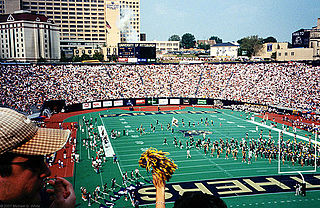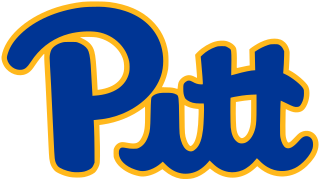Related Research Articles

Pitt Stadium was an outdoor athletic stadium in the eastern United States, located on the campus of the University of Pittsburgh in the Oakland neighborhood of Pittsburgh, Pennsylvania. Opened in 1925, it served primarily as the home of the university's Pittsburgh Panthers football team through 1999. It was also used for other sporting events, including basketball, soccer, baseball, track and field, rifle, and gymnastics.

David Wannstedt is a former American football coach. He has been the head coach of the Chicago Bears and Miami Dolphins of the National Football League (NFL). He was also the head coach of the University of Pittsburgh football team from 2005 to 2010. He also was a long-time assistant to Jimmy Johnson with the Dallas Cowboys, Miami Hurricanes, and Oklahoma State Cowboys as well as an associate of Johnson when both were assistants at the University of Pittsburgh.
Walter William Harris is a former American football player and coach. Harris served as the head football coach at the University of the Pacific in Stockton, California from 1989 to 1991, the University of Pittsburgh from 1997 to 2004, and at Stanford University from 2005 to 2006, compiling a career college football record of 69–85.
Frank Thomas Solich is a former American football coach and former player. He is the former head coach at Ohio University, a position he held from 2005 until 2021. From 1998 to 2003, Solich served as the head coach at the University of Nebraska–Lincoln, where he also played fullback under Bob Devaney in the mid-1960s.

The Pittsburgh Panthers football program is the intercollegiate football team of the University of Pittsburgh, often referred to as "Pitt", in Pittsburgh, Pennsylvania. Traditionally the most popular sport at the university, Pitt football has played at the highest level of American college football competition, now termed the NCAA Division I Football Bowl Subdivision, since the beginning of the school's official sponsorship of the sport in 1890. Pitt competes as a member of the Atlantic Coast Conference (ACC).

Michael Todd Graham is an American football coach and former player. He was most recently the head football coach at the University of Hawaiʻi at Mānoa (2020–2021). Graham has served as the head football coach at Rice University (2006), the University of Tulsa (2007–2010), the University of Pittsburgh (2011), and Arizona State University (2012–2017).

The Pittsburgh Panthers men's basketball team is the NCAA Division I intercollegiate men's basketball program of the University of Pittsburgh, often referred to as "Pitt", located in Pittsburgh, Pennsylvania. The Pitt men's basketball team competes in the Atlantic Coast Conference (ACC) and plays their home games in the Petersen Events Center. The Panthers were retroactively recognized as the pre-NCAA tournament national champion twice by the Helms Athletic Foundation and once by the Premo-Porretta Power Poll. Pitt has reached one Final Four, received 15 First Team All-American selections, appeared in 27 NCAA tournaments through the 2022–23 season, and has recorded 1,674 victories against 1,232 losses since their inaugural season of 1905–06.

Walter Scott "Mike" Milligan was an American football player and coach of football and basketball. He served as the head football coach at the University of Pittsburgh from 1947 to 1949 and for one season as the head basketball coach at the University of Tulsa (1942–43).
Noel Scott Mazzone is an American football coach and former player who is the offensive coordinator and quarterbacks coach for the Pittsburgh Maulers of the United States Football League (USFL). He is former offensive coordinator at the University of Arizona.
Carl Anthony Pelini is an American football coach. He served as defensive coordinator at Youngstown State University for the 2019 season. Pelini previously served as the head coach of Florida Atlantic from 2012 to 2013. He is the older brother of Bo Pelini, the former head coach at Nebraska and Youngstown State as well as defensive coordinator at LSU.
The 2008 Pittsburgh Panthers football team represented the University of Pittsburgh in the 2008 NCAA Division I FBS football season. The season was the fourth under head coach Dave Wannstedt. The 2008 season marked the team's eighth at Heinz Field and the program's 119th season.

The UPMC Rooney Sports Complex is a multipurpose, multisport training, sports science, and sports medical complex of the University of Pittsburgh Medical Center. The complex is located along the shore of the Monongahela River in Pittsburgh, Pennsylvania, and is unique in that it is the only facility in the United States housing the practice and training facilities for both a collegiate National Collegiate Athletic Association (NCAA) football team and a professional National Football League (NFL) team, the Pittsburgh Panthers and Pittsburgh Steelers respectively. It is also unique in that it combines these training facilities in one location with an academically based sports science and medicine program. The complex consists of four centers which include the Center for Sports Medicine, Sports Training Center, Indoor Training Center, and the Fitness and Conditioning Center located in three buildings along with four outdoor practice fields all situated on 40 acres (16 ha) of land. The UPMC Center for Sports Medicine located in the complex is an international destination for amateur and professional athletes alike for its training, medical, and rehabilitation studies and services.

The City Game is an annual college basketball game between the University of Pittsburgh Panthers and the Duquesne University Dukes. The term "City Game" is also used refer to women's basketball games played annually between the two universities and may also be used to refer to other athletic competitions between the two schools.
The 2009 Pittsburgh Panthers football team represented the University of Pittsburgh in the 2009 NCAA Division I FBS football season. The season was the fifth under head coach Dave Wannstedt. The 2009 season marked the team ninth at Heinz Field and the program's 120th season overall. The 2009 season saw the introduction of a new offensive coordinator, Frank Cignetti, Jr. Pitt got off to a 9–1 start with impressive wins over Navy, Notre Dame for the second consecutive year, and Rutgers for the first time since 2004. Pitt was ranked number 9 in the AP and BCS polls and was off to its best start since 1982. However, Pitt lost the final two regular season games, including a last second loss by a field goal at West Virginia and a one-point loss at home for the Big East championship to undefeated Cincinnati, to finish the regular season at 9–3 for the second consecutive year. The Panthers rebounded by winning the Meineke Car Care Bowl over North Carolina, 19–17, to achieve its first ten-win season since 1981. Pitt ranked number 15 in the final 2009 AP rankings with a 10–3 record. In addition, Pitt players garnered many post-season accolades in 2009, including Big East Offensive Player and Rookie of the Year in Dion Lewis, and Big East Co-defensive Players of the Year in Mick Williams and Greg Romeus.
The 2010 Pittsburgh Panthers football team represented the University of Pittsburgh in the 2010 NCAA Division I FBS football season. The Panthers were members of the Big East Conference. They were led by the sixth-year head coach Dave Wannstedt and played their home games at Heinz Field. 2010 marked the university's 121st season overall. They finished the season 8–5, 5–2 in Big East play to be champions of the Big East with Connecticut and West Virginia. However, due to losses to both schools, Pitt did not earn the conference's bid to a Bowl Championship Series (BCS) game. They were invited to the BBVA Compass Bowl where they defeated Kentucky, 27–10. Wannstedt was forced to resign on December 7, 2010.

The Petersen Sports Complex (PSC) is a 12.32-acre (4.99 ha) multi-sport athletic facility on the campus of the University of Pittsburgh in Pittsburgh, Pennsylvania. It houses Charles L. Cost Field, Vartabedian Field, and Ambrose Urbanic Field, the respective home practice and competition venues of the university's NCAA Division I varsity athletic baseball, softball, and men's and women's soccer teams. Known as the Pittsburgh (Pitt) Panthers, these teams compete in the Atlantic Coast Conference. The complex is located adjacent to the school's Trees Hall and Cost Sports Center near the remainder of the university's other upper campus athletic facilities.
The 2011 Pittsburgh Panthers football team represented the University of Pittsburgh in the 2011 NCAA Division I FBS football season. The Panthers were led through the regular season by first-year head coach Todd Graham and played eight home games at Heinz Field. Defensive coordinator Keith Patterson was named interim coach for the season-ending bowl game after Graham resigned in favor of a head coaching position at Arizona State.
American football in Western Pennsylvania, featuring the city of Pittsburgh and surrounding areas, has had a long and storied history, dating back to the early days of the sport. All levels of football, including high school football and college football, are followed passionately, and the area's National Football League (NFL) team, the Pittsburgh Steelers, is consistently one of the sport's most popular teams. Many of the NFL's top stars have come from the region as well, especially those that play quarterback, earning Western Pennsylvania the nickname "Cradle of Quarterbacks".

The history of Nebraska Cornhuskers football covers the history of the University of Nebraska–Lincoln's football program from its inception in 1890 until the present day. Nebraska competes as part of the NCAA Division I Football Bowl Subdivision, representing the University of Nebraska–Lincoln in the Big Ten Conference. Nebraska has played its home games at Memorial Stadium since 1923 and sold out every game at the venue since 1962.
The Pittsburgh Panthers team represents the University of Pittsburgh in American football.
References
- ↑ University of Pittsburgh football media guide 2002, pg. 269, accessdate=2009-01-29
- ↑ Mike Prisuta, Pederson Man behind turning of the Panthers' athletic fortunes, Pittsburgh Tribune-Review, 2002-04-07, accessdate=2009-01-29 [ permanent dead link ]
- ↑ Ray Fittipaldo, Can Pederson regain magic touch?, Pittsburgh Post-Gazette, 12-01-2007, accessdate=2009-01-29
- ↑ Kevin Gorman, Pederson returns at Pitt AD, Pittsburgh Tribune-Review, 2007-12-01, accessdate=2009-01-29 Archived December 2, 2007, at the Wayback Machine
- ↑ E.J. Borghetti, Pitt Chronicle, Pederson returns to lead university's athletic department, 2007-12-03, accessdate=2008-01-29
- ↑ Bob Smizik, Pitt gets it right with Pederson's return, Pittsburgh Post-Gazette, 2007-12-01, accessdate=2009-01-29
- ↑ University of Pittsburgh football media guide 2002, pg. 268, accessdate=2009-01-29
- ↑ http://journalstar.com/sports/football/college/pederson-created-stir-at-pittsburgh-too-but-his-success-turned/article_3383e765-a528-5e51-9e24-440e59821695.html;Pederson [ permanent dead link ] created stir at Pittsburgh, Lincoln Journal Star
- ↑ Pederson fired; Nebraska chancellor cites lack of football progress
- ↑ Nebraska Yearly Totals Archived February 16, 2010, at the Wayback Machine on cfbdatawarehouse.com
- ↑ Rosenthal, Brian (October 15, 2007). "Pederson out as NU's AD". JournalStar.com. Retrieved May 31, 2019.
- ↑ Paul Zeise, Pederson's goal: Sellouts at Heinz, Pittsburgh Post-Gazette, 2007-12-23, accessdate=2009-01-29
- ↑ "Panther-lair - Pederson out as Athletic Director".
- ↑ Ray Fittipaldo, Dixon gets extension, raise, Pittsburgh Post-Gazette, 2008-09-26, accessdate=2009-01-29
- ↑ Paul Zeise, Berenato receives 3-year extension, Pittsburgh Post-Gazette, 2008-10-10, accessdate=2009-01-29
- ↑ Zeise, Paul (December 16, 2010). "Pitt hires Miami (Ohio) coach Haywood". Pittsburgh Post-Gazette. Pittsburgh Post-Gazette. Retrieved December 16, 2010.
- ↑ "Pitt fires coach facing domestic violence charge". January 2011.
- ↑ "Fired Pitt coach, former Irish coordinator to be arraigned Monday in South Bend". www.wndu.com. Archived from the original on January 2, 2011. Retrieved January 12, 2022.
- ↑ Zeise, Paul (January 11, 2011). "Pitt's search ends with hiring of Tulsa's Graham". Pittsburgh Post-Gazette. Pittsburgh, PA. Retrieved January 11, 2010.
- ↑ "Pederson on Move to ACC "Very Exciting, and Very Historic"". July 2013.